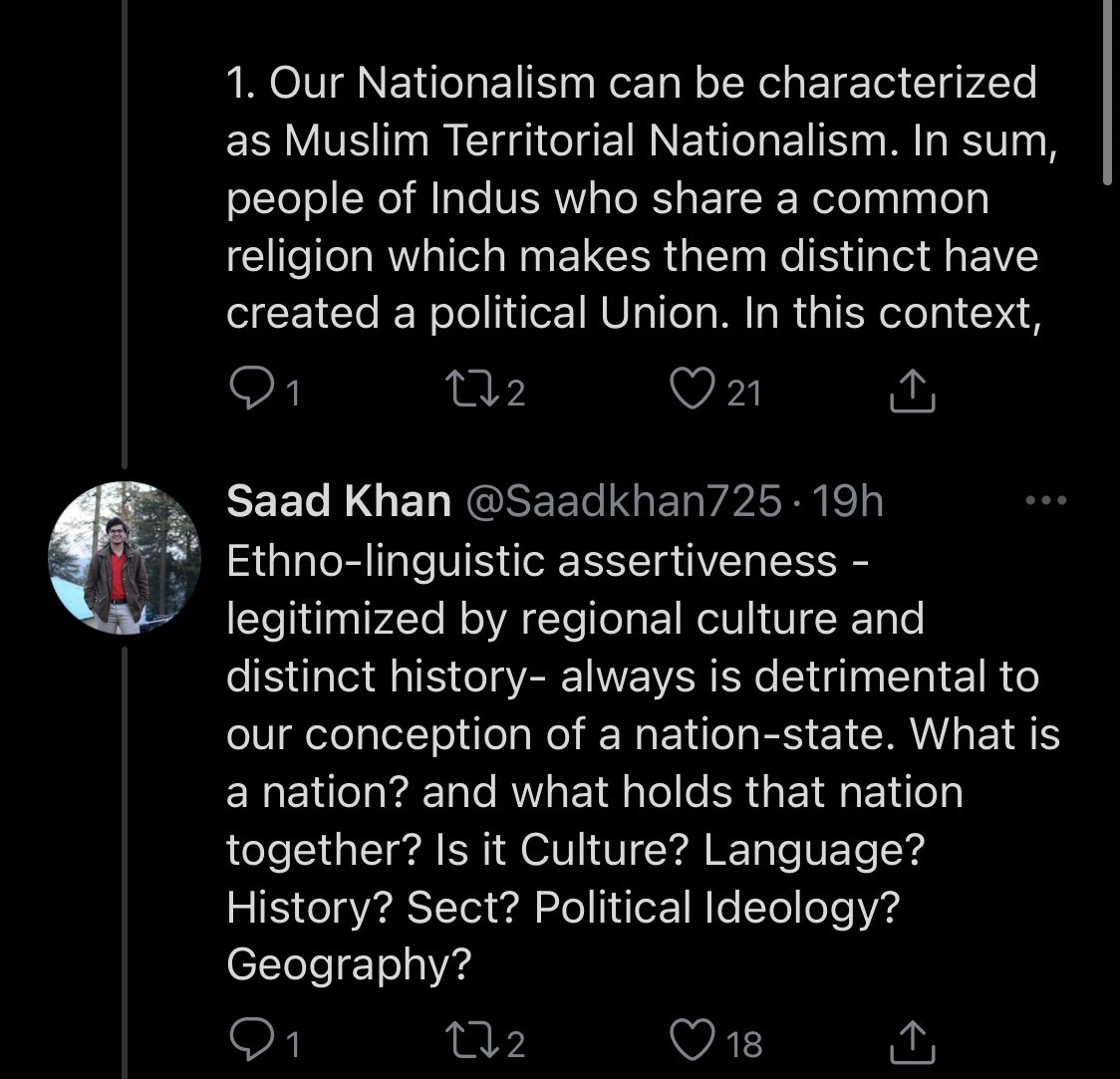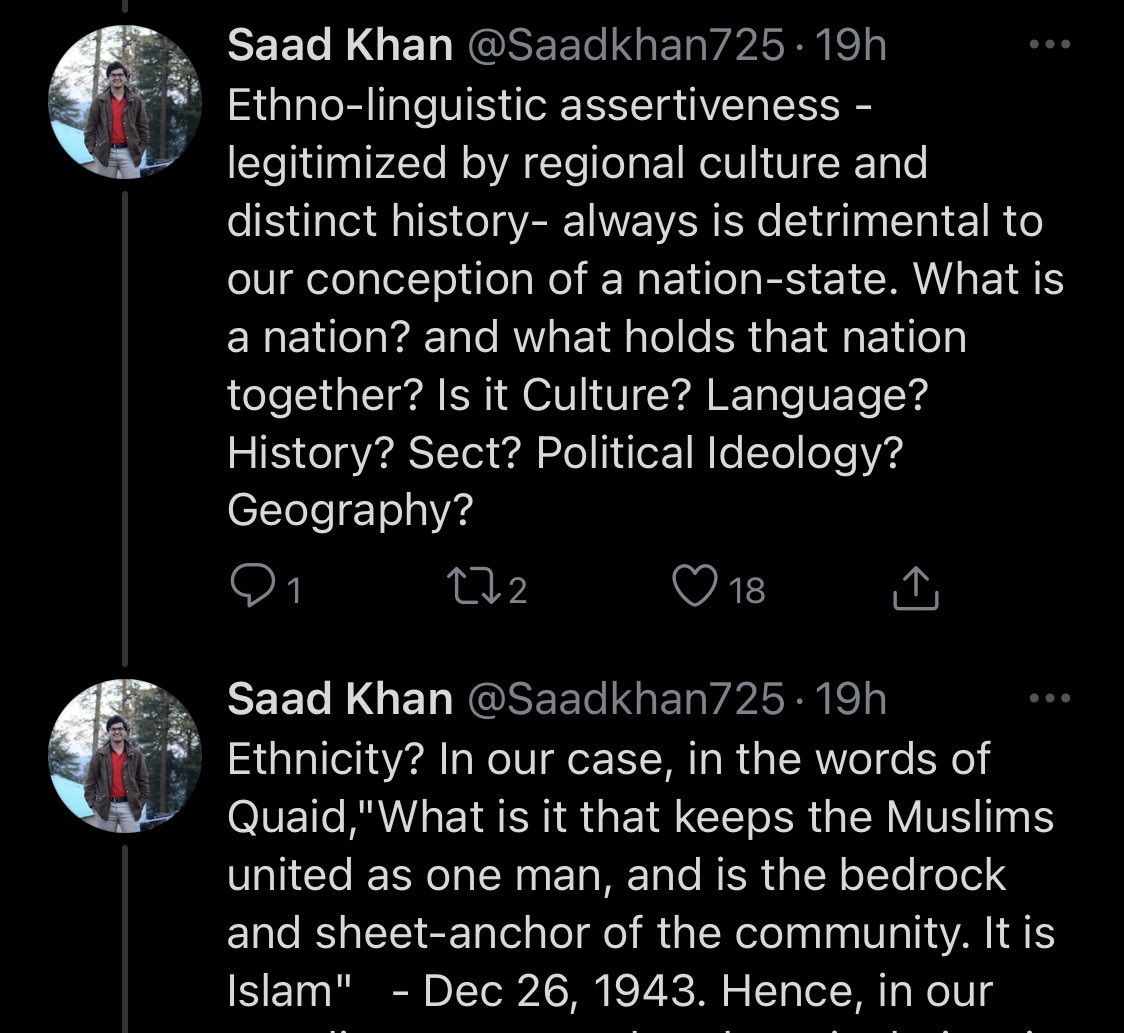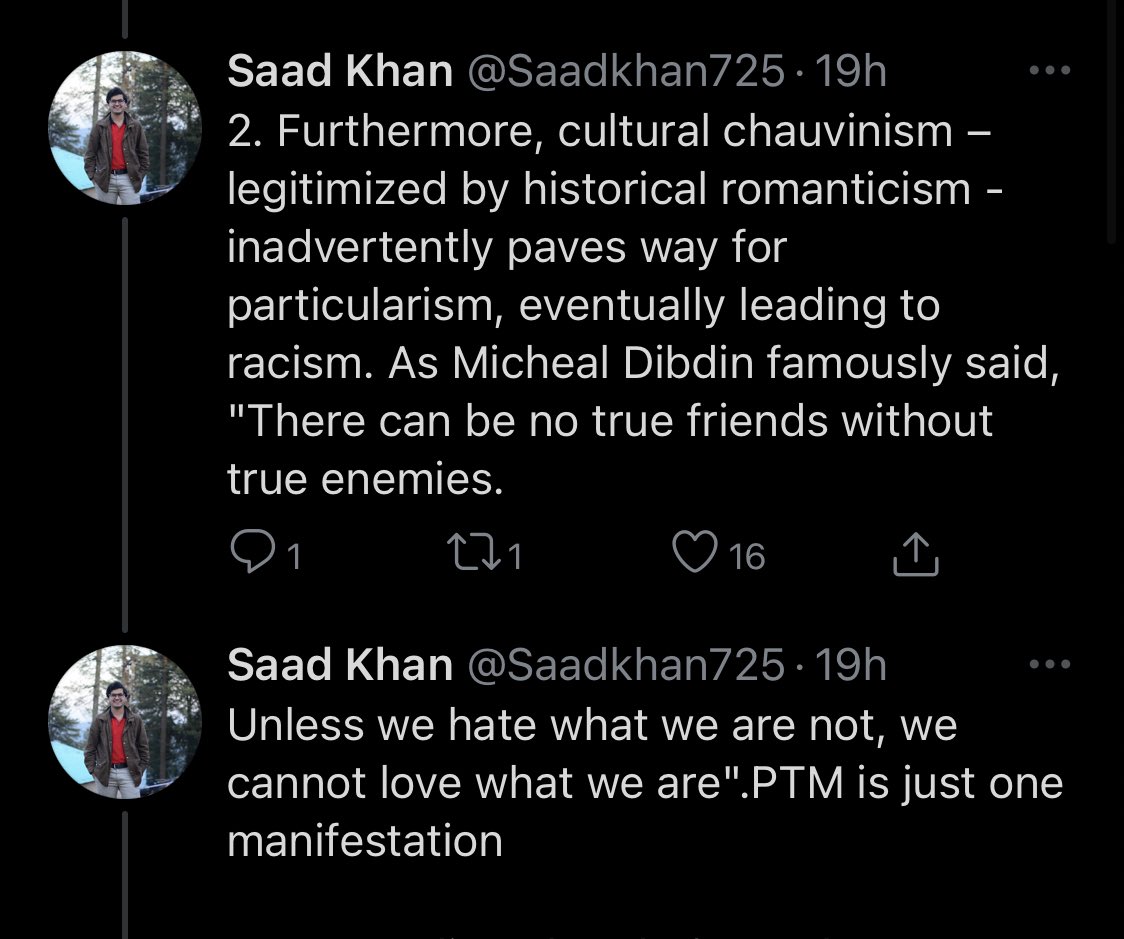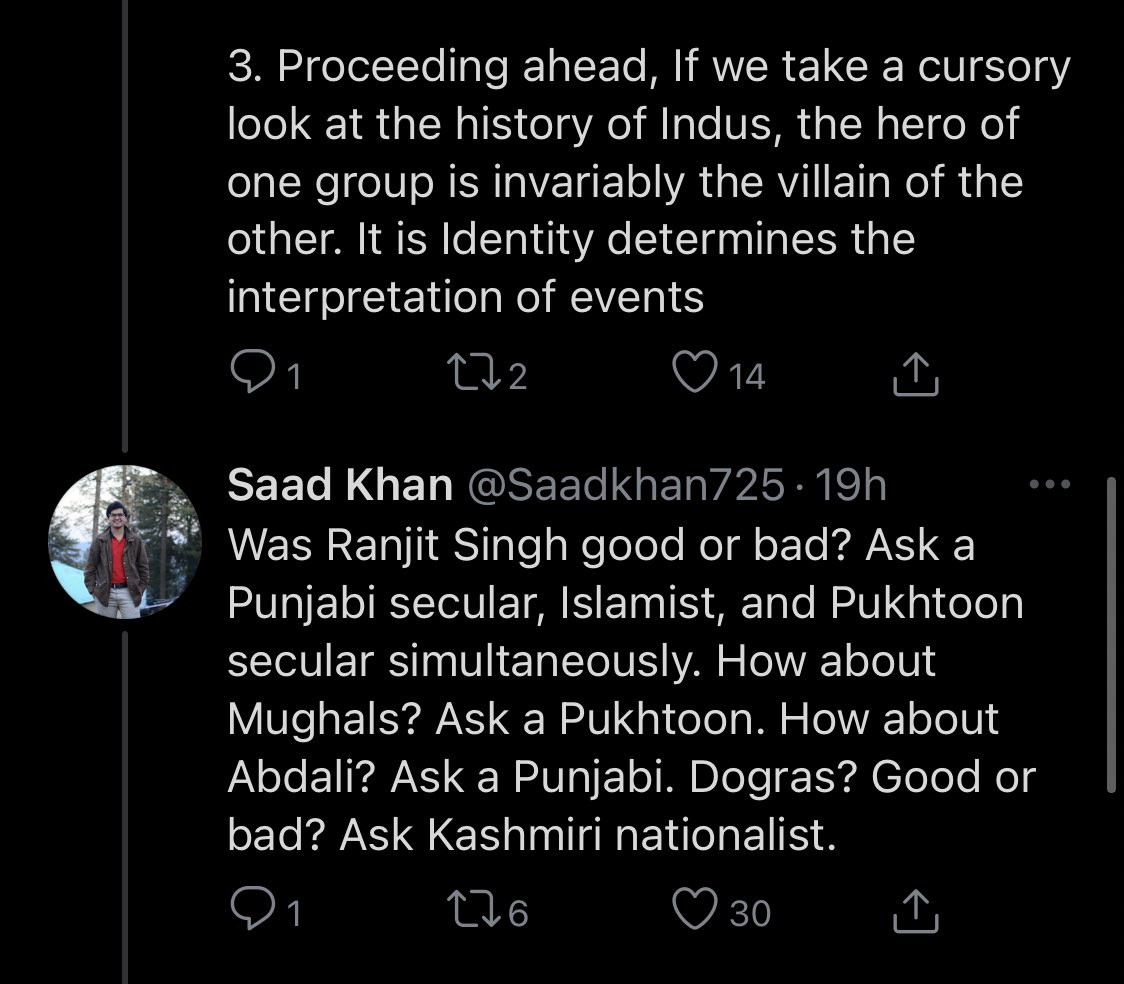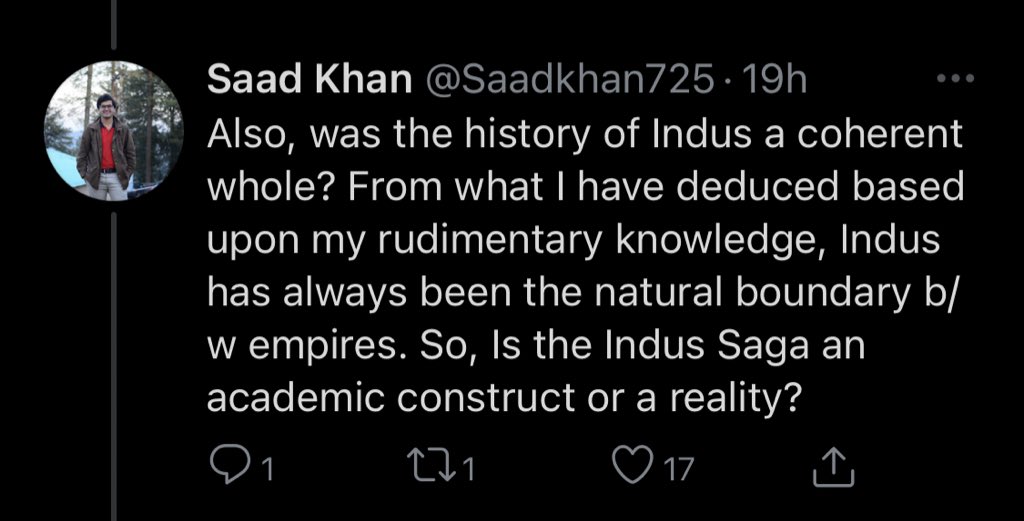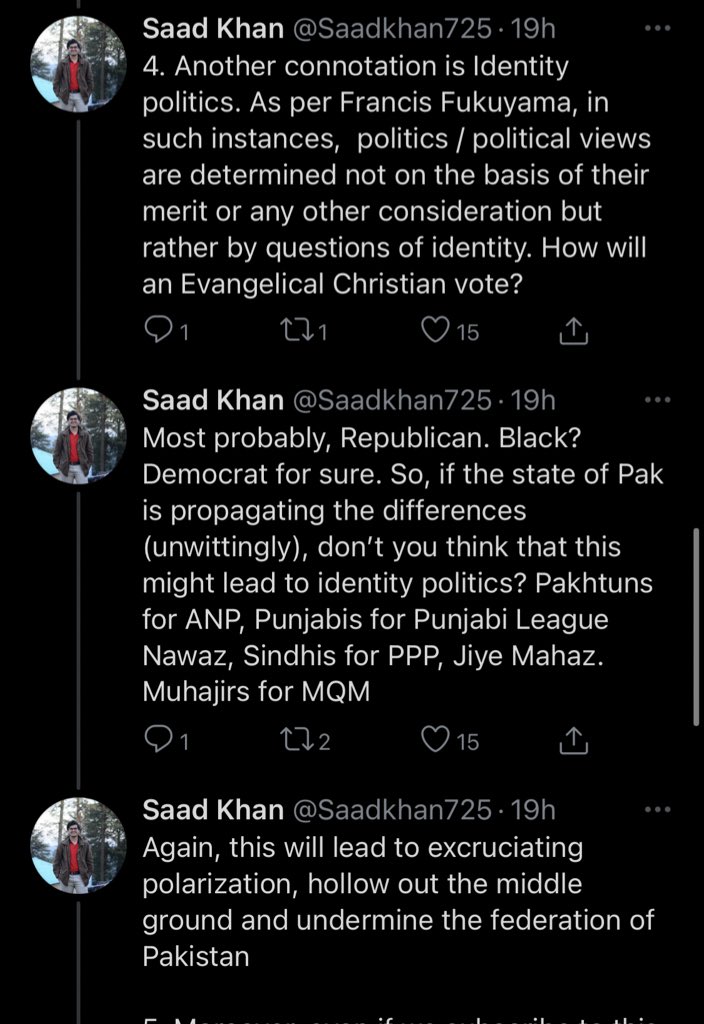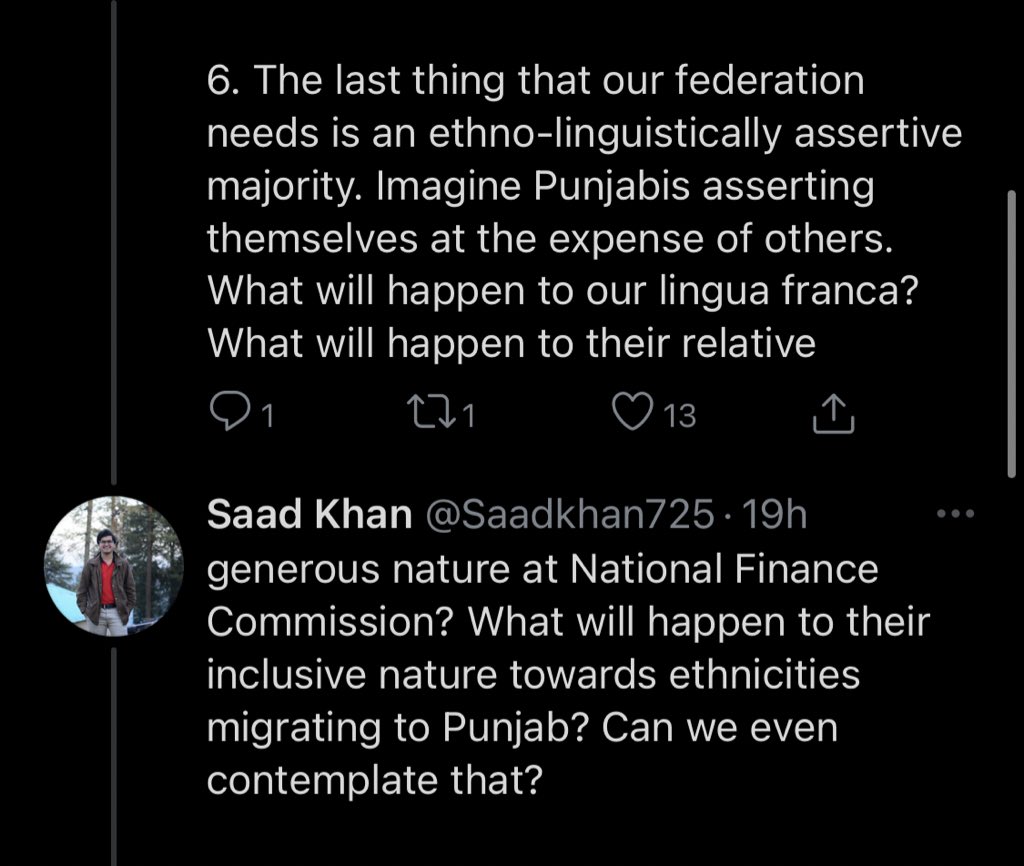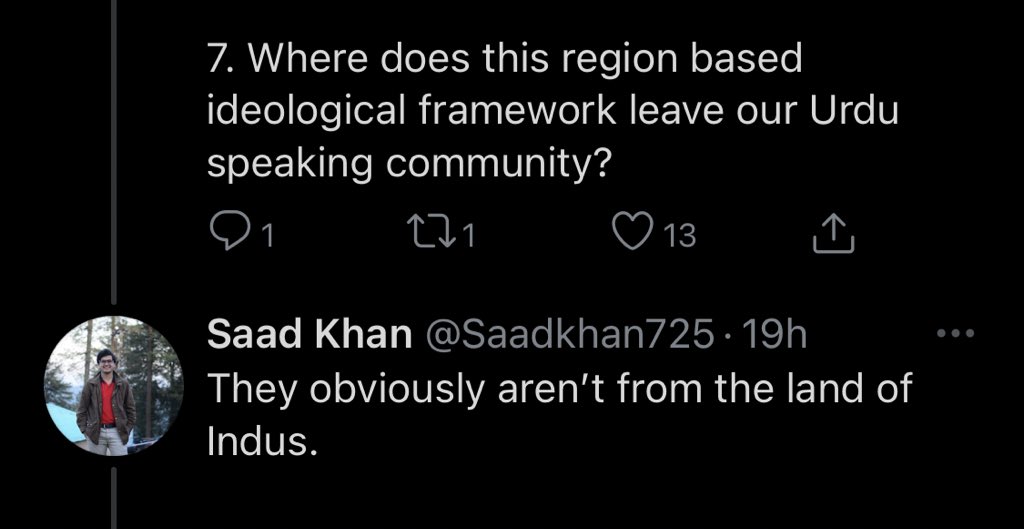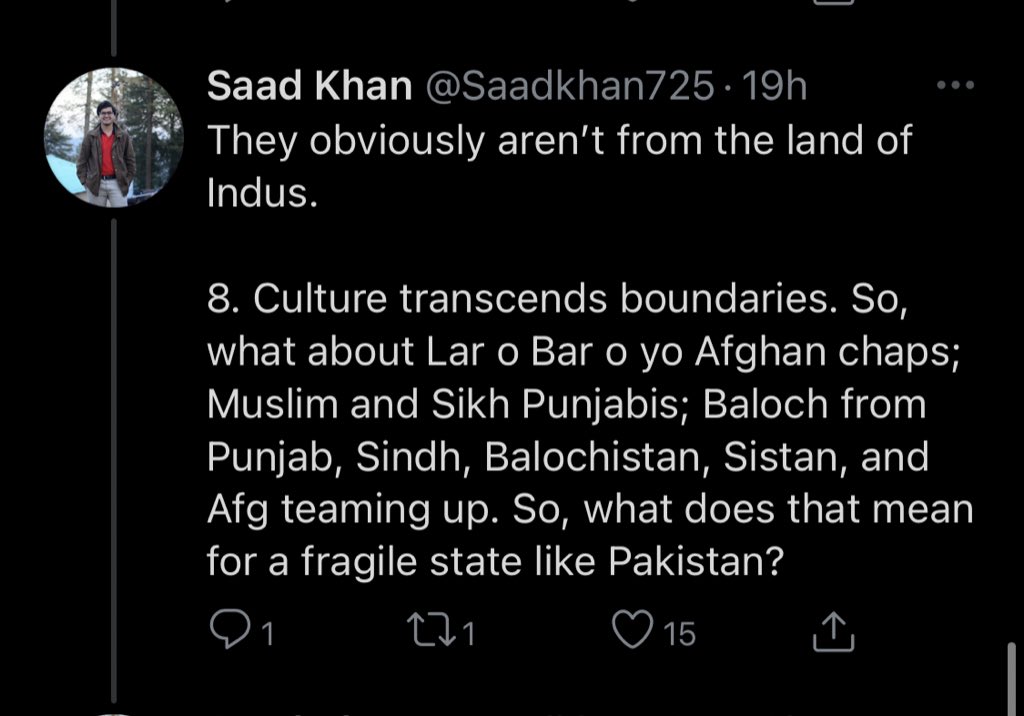I appreciate such a detailed response to my tweet on Pakistan, ethnicities and history.
However since your response claims a semblance of acceptance to our ethnic identity and history damages Pakistan, allow me to reply to you in a few points 1/n https://twitter.com/saadkhan725/status/1361370432033742853
However since your response claims a semblance of acceptance to our ethnic identity and history damages Pakistan, allow me to reply to you in a few points 1/n https://twitter.com/saadkhan725/status/1361370432033742853
But little disclaimer. My work is based around History and so was the original tweet. I don’t care much for political debates such as the one that’s going to take place. But since the questions he asked require certain answers, I might tread out of my boundaries in history.
1. Believing that acceptance of local languages and history/culture is somehow detrimental to Islam and Pakistan is a rudimentary debate since no Muslim in the world is expected to shy away from their language. It is not as if other Muslims in the world don’t have their own -
Own languages or culture? Pakistan is not the only Multi ethnic Muslim state in the world. Other such states exist and function fully by accepting their languages culture/history.
Your question and statement of Islam being the uniting factor answers your second question;
Your question and statement of Islam being the uniting factor answers your second question;
By using words like ‘unifying’ you accept that we are different and that our identities have many factors which contribute to them. I accept that Islam forms the core of both our identities but we also have other factors which contribute to said identity.
Pakistanis are different within themselves and that’s a beautiful thing. Any person or state that is frightened of diversity is simply myopic in their understanding of what forms their country and its identity. Cultures always play a part even if the state denies that.
2. This is yet another myopic take on calls for local languages and history. It is not ‘cultural chauvinism’ for one to yearn for understanding their script or to be able to read and write in their own language or identify figures from their own history.
Legitimate historical romanticism is found in every nation for portions of their history from which they can derive pride. A lack of this is in Pakistan why half your nation can name you figures from 14th century Beyliks in Anatolia (Turkey) but not men from their own regions.
There is a very stark difference between Romanticism and Revisionism. Simply being taught to appreciate people from your country doesn’t hurt anyone. Revisionism is altogether different concept employed by states as political tools.
Also movements like PTM stem from extreme internal and external politics, proxy wars and many other contributing factors. To link such movement’s cultural chauvinism to be coming from merely an acceptance of local history isn’t a correct take.
3. Then we arrive at the famous ‘One ethnicities Hero is another’s villain’.
This debate goes both ways. There are figures who’d be antagonised by one and adored by others but Pakistan also has a large history of people from Multiple ethnicities working together.
This debate goes both ways. There are figures who’d be antagonised by one and adored by others but Pakistan also has a large history of people from Multiple ethnicities working together.
A few such people to mention:
One of Sindh’s greatest warrior Generals was a Baloch; Dulla Darya Khan Lashari. It was his battle against the Arghun Turks on behalf of the Sindhis that saved Sindh’s golden age from a premature death.
The Punjabi sultans of the Langah
One of Sindh’s greatest warrior Generals was a Baloch; Dulla Darya Khan Lashari. It was his battle against the Arghun Turks on behalf of the Sindhis that saved Sindh’s golden age from a premature death.
The Punjabi sultans of the Langah
Langah Sultanate were allied with the Balochs. It is believed that the arguably greatest Baloch figure Mir Chakar Rind himself was allied with him and settled near Multan. This was the first facilitation of Balochs on Punjabi land by Punjabis.
In the north we have instances of Pashtuns and Chitralis coming together to expel outsiders from their lands. We know of all of northern Pakistan together attacking the Dogras twice. The north Pakistani king Su Malik is famous from Nuristan to Ladakh.
There are many instances of Pashtuns and Punjabis interacting with one another on the periphery areas in Hazara and the other trans Indus territories and in larger imperial armies. I can go on with many more references but I’m afraid that requires another thread altogether.
The problem with this Pakistani notion of one’s hero other’s villain is that we have somehow believe we’ve only been together for a 100 years. The mutual contacts of our people go back millennia. You can find more cooperation than animosity.
Also Ranjit Singh was more cruel to Muslim Punjabis than to Pashtuns so I don’t really see the point of bringing him up.
To answer another one of your questions; the Indus is a peculiar basin. It runs north to south with one side running along a desert and the other alongside mountains with favourable passes. This lead to many many different exposures which brings more colours to Pakistan.
4. Bringing up Identity politics once again colludes to my point of viewing mere acceptance of local history as an ethno nationalist movement.
Teaching a Punjabi kid about Jasrat Khokar or a Pashtun kid about Khushal will not make them raise flags of independence.
Teaching a Punjabi kid about Jasrat Khokar or a Pashtun kid about Khushal will not make them raise flags of independence.
5. Your 5th point is once again the same, that studying and accepting history somehow will lead Punjabis to become ‘assertive’.
If Punjabis wished to be assertive in the past 70 years, you and I would be having this conversation in Punjabi and not English.
If Punjabis wished to be assertive in the past 70 years, you and I would be having this conversation in Punjabi and not English.
7. Indus is merely a name for the archaic region on which Pakistan stands, it’s not what nation state is based on, so Muhajirs fit right in. Muhajirs also have a rich history from the regions from which they migrated. Much of the Indo-Persianate legacy is carried by them.
8. Culture transcending boundaries is an excellent thing. All cultures transcend boundaries, that is how various nations foster better relations. There is nothing wrong with us using our similarities with our neighbours to create better ties and cherish shared cultures.
Now I have many other things on my mind but there’s hardly things that I’ll be able to properly explain over here.
The dilemma of us Pakistanis is that we shun before we understand.
The Indus Basin/Indus region/Indus Valley are mere names of the region that Pakistan
The dilemma of us Pakistanis is that we shun before we understand.
The Indus Basin/Indus region/Indus Valley are mere names of the region that Pakistan
Stands upon. All countries of the world stand upon a certain archaic region. Before the creation of the Westphalian system of nation states, most areas were known by geography; Pakistan’s union of regions creates the Indus basin.
That is all that there is to this debate. It doesn’t mean Pakistan was formed on Indus nationalism or that our passports mention that we are “children of the Indus”. No, Pakistan most certainly comes from Islamic nationalism but like all countries stands on a geographic area.
Every geographic area comes with a certain ethnicity or group of ethnicities. So does Pakistan. Now for us to think that us merely accepting or learning our languages and history (which also mostly fall under Islamic umbrella) is somehow detrimental to the state is idiocy
No country can arbitrarily form and to through the most heinous and turbulent of eras that we went through and then be threatened by a small history book?
It is the old insecurity thrown upon us that our country is artificial and thus anything and everything can jeopardise it.
It is the old insecurity thrown upon us that our country is artificial and thus anything and everything can jeopardise it.
Take me for instance, I’m from Chitral, high in the mountains near Tajikistan yet it is extremely fascinating for me to read about Mir Chakar Rind Baloch. About Jam Nizammudhin Sindhi. About Ayn Ul Mulk Multani. About Khushal Khan Khattak because I take them as my own.
If my compatriots have reverence for them, then why shouldn’t I?
The fear that teaching history will bring us apart can also be fixed. Teach history as a whole. A child from KP should be taught about the Samma Sindhi dynasty. A kid from Punjab should know about Baloch heroes.
The fear that teaching history will bring us apart can also be fixed. Teach history as a whole. A child from KP should be taught about the Samma Sindhi dynasty. A kid from Punjab should know about Baloch heroes.
Us from the north should know about what customs and cultures dominate the areas of our brethren to the south. That is how nations work, and that is how I hope Pakistan will somehow be too; so we can appreciate diversity.

 Read on Twitter
Read on Twitter